- Home
- Ian McDonald
Luna--Wolf Moon--A Novel Page 31
Luna--Wolf Moon--A Novel Read online
Page 31
This could not be rushed.
The hatch opened.
The medics poured into the spaceplane.
* * *
Three days after the VTO cycler Saints Peter and Paul swung around the back of the Earth and out to the moon, Corta Aqua sent notices to all its customers. With the change of management it would be necessary to hire contract engineers to maintain the high quality of purity and supply. Regrettably, this meant that prices would rise. Just a little.
* * *
The spinning stars spun her dizzy.
The observation bubble was a toughened glass dome at the end of Saints Peter and Paul’s spin axis, large enough to allow two to look out at space. Two young VTO women in bright tight flight-suits had brought her up to the hub and told her to wait. Wait, Alexia had called back, but they were already swimming along the central hand-line, kicking forward on soft flippers. Should I hold place with the ship or should I turn with the stars? If she braced herself against the observation bubble’s rail the stars whipped by so quickly her head reeled. If she let go of the rail, spread-eagled and pushed herself into a spin, she still could not match the rotation speed of the stars and the apparent turning of the ship around her left her dazed, unable to focus and a choke away from vomiting.
Free fall and Alexia Corta were not a happy marriage. The muscles that Norton had painstakingly built around her core armoured her against the cruelties of liftoff but either over-operated or cramped when she tried to move in zero gee. Her feet, her hands and, most hideously, her face were bloated and tight. Her skin felt stretched and unclean, the lower air pressure in the cycler left her itchy. She could not control her hair, it went in her eyes, she inhaled it, was blinded by it, until a spacer gave her a net. When she tried to get around, her hands and feet moved like a small dog swimming.
She grabbed the handrail and pushed up into the dome. Alexia Corta gave a small gasp. She was floating in space. Swirling stars crowned her. If she looked down she could see the solar panels arrayed around her like the petals of a moon-flower. Beneath them were the nested habitat rings and if she pushed herself to the edge of the dome she could catch the edge of the comms and manoeuvring modules. She wheeled through space on a glass throne.
‘There’s a look, I suppose.’
The view had been so captivating that Alexia had not seen the figure approach. It hovered a metre from the guide-line, anchored by tethers and carabiners.
‘What?’
‘A Corta look. And a Corta impudence.’
‘Gospodin Vorontsov.’
The man shrugged and grimaced. A man, she thought; the figure was so warped, so attenuated and extended, so stretched out in tubes and tethers that gender is the last identification. Were those colostomy bags?
‘I am Alexia Corta.’
The man grimaced again, dismissed her outreached hand. He had subtly changed orientation to match her. Free-fall etiquette. Alexia remembered that.
‘You were a water engineer. That’s an admirable profession. Primal.
Everything comes from water and ends with water.’
‘Thank you, sir.’
‘I hear he’ll live.’
‘He was clinically dead for seven minutes, sir. Your crash team got to him just in time. A severe myocardial infarction.’
‘I told him Earth would crush his heart. So you’re the last Corta.’
‘Lucas is in recovery, sir.’
‘You know what I mean. I was flying this ship when Adriana Corta went to the moon. Fifty years is a long time to wait for a Corta.’
‘Fifty years is a long time to spend in space, sir.’
Valery Vorontsov’s eyes flashed.
‘Weird and sick. Inbred idiots, riddled with radiation. DNA rotting inside. Not like us. Not like us at all.’
‘No, sir…’
‘That’s what they think. They’ve always looked down on us. The Asamoahs think we’re barbarians. The Mackenzies think we’re drunken clowns. The Suns think we aren’t even human. Pity. I would have liked to have told Lucas to his face. I’ll tell you instead.’
‘Sir, I’m only…’
‘The last Corta. You’ve got your gun.’ Valery Vorontsov laboriously hauled himself around on the hand-line. His colostomy and piss bags bobbed after him.
‘Sir!’
Valery Vorontsov stopped.
‘Lucas gave me something. A code.’
‘I am far too old for l’esprit de l’escalier,’ Valery Vorontsov said. ‘I simply cannot bear the sudden turns. Tell me what you have to tell me.’
‘It’s a command code. I don’t know what it does.’
‘What did Lucas say?’
‘It summons the lightning.’
‘You have your answer.’
‘He said if he was unable to ask me for it, or consent to its operation in any way, I was to use it.’
Valery Vorontsov sighed heavily and completed his manoeuvre. He pulled himself along the line, soaring glides metres long. From the elevator lock he called back, ‘Do you think the two worlds need a little lightning?’
* * *
The stars wheeling around her head, Alexia Corta lifted the axe of Xango the Just to her lips and kissed it.
You must trust that if I say I will do something, I can do it, she had said. Mão de ferro.
Alexia whispered the word of power Lucas taught her.
‘Ironfall.’
10: SCORPIO 2105
Two hundred and forty. So many numbers in Luna Corta’s head. Eight. One. Twenty-five. Eight. Thirty. Three. More than any of those small numbers, two hundred and forty.
Two hundred and forty. The number of seconds a human brain can survive without oxygen.
Eight. Per cent battery power remaining in Luna Corta’s shell-suit.
One. Degree Celsius. The temperature to which Jinji dropped Lucasinho Corta’s sasuit environment control as his air reserves ran out.
Twenty-five. Degrees Celsius. The temperature at which both the human diving reflex and hypothermia kick in, substantially buffering the brain against the effects of hypoxia.
Eight. The distance in kilometres to the nearest outlock of João De Deus.
Thirty: the maximum safe run-speed of a Mark 12 VTO shell-suit.
‘Luna: Lucasinho gave me air, how do I give it back to him?’ Luna asks her familiar.
You don’t have enough air to get both of you to João de Deus, other Luna says.
‘I’m not going to João de Deus,’ Luna Corta says.
Three. The final number on Luna Corta’s helmet HUD. The distance in kilometres to the outlock of Boa Vista.
You don’t have enough air to get both of you to Boa Vista, Luna says.
Two hundred and forty. The number of seconds a human brain can survive without oxygen. Three divided by thirty. Luna can’t do that math but it is how long it will take her at full run to get to Boa Vista, and it must be less than two hundred and forty seconds. But she has only eight per cent power, and there will be the extra mass, and will the suit let a nine-year-old girl run it at full speed?
Leave the numbers to me, Luna.
Luna commands her suit to kneel. The shell-suit hands are big and clumsy, Luna is inexperienced in the haptics and she has never picked up an object as precious as the one she tries to lift now.
‘Come on,’ she whispers, terribly afraid of breaking something as she slides the mitts under Lucasinho’s body. ‘Oh please, come on.’
She straightens her legs and scoops Lucasinho up in her arms.
‘Okay suit,’ she commands. ‘Run.’
The acceleration almost knocks her backwards. Luna cries in pain as she feels her joints jerk and rip. Her legs are tearing from their sockets. They can’t move this fast, nothing can move this fast. The suit gyros steady her, snap her back to balance. She almost drops Lucasinho. In her red and gold shell-suit, Luna Corta races across Mare Fecunditatis. She runs from black to grey, hurdling the line between Glassland and raw dirt. Regolith flies
from her feet; a trail of slow-settling dust.
One hundred and ninety. That’s a new number Luna her familiar has flashed up on her helmet. The number of seconds it will take her to reach Boa Vista’s main lock. But then she has to get from the lock to the refuge. The lock has to open. The lock has to recognise her. How many seconds will that add to one hundred and ninety?
‘Luna,’ she says, and sings a song she has known all her life; one her paizinho sang over her bed when he came into the madrinhas’ nursery every night. Listen to my song, anjinho. Sing it back to me. The song activates Boa Vista’s emergency protocols.
What if the machines are broken? What if the power is out? What if a hundred different fails means the lock won’t open? What if Boa Vista won’t listen to her song?
In her shell-suit, legs screaming with cramp and joint pain, Luna Corta holds her breath.
I have acknowledgement from Boa Vista, Luna says.
Now she sees the beacons come alive; rotating red lights on pylons, guiding the lost and the moonwrecked home. Her cousin in her arms, Luna runs up the vee of guiding lights. Ahead is the sintered slope to the main lock, and a slot of darkness opening before her.
It hurts it hurts it hurts. Nothing has ever hurt so much. All across her helmet HUD numbers turn white. White for out. White for death. Centimetre by centimetre the line of darkness expands into a rectangle.
‘Luna, show me the refuge.’
A yellow map overlays the grey and black: a schematic of Boa Vista. The refuge is a green cube ten metres beyond the lock. Luna focuses on it and her familiar fills the graphic with numbers. What Luna reads from them is some air, some water, some medical help. Some shelter, for a time.
She races under the still-rising guillotine of the outlock gate into the dark.
I don’t have power for the helmet lights, Luna apologises, but the suit steers true, navigating by memory. There, the green in the dark, the soft green emergency light through the porthole. Kind, lovely green.
Two hundred and ten seconds.
‘Guava juice, Luca,’ Luna says. ‘Guava juice from Café Coelho. Very cold.’
* * *
Helmet lights play across the bore of the tunnel, sweeping down the smooth walls, across the sintered guide-way, bobbing in rhythm with the bodies. Running figures, running as fast as they dare in this dangerous place; swooping, soaring strides covering metres in a step: Geni, Mo, Jamal, Thor and Calyx. Their sasuits are carnivals of colour and pattern: yellow and white chevrons; patches and stickers of sports teams; cartoon figures hand-drawn in red marker. The impassive, comically-beatific face of Vishnu. Luminous spots: this one moves in a disconcerting, alien dance through the dark tunnel. Terse instructions flicker from helmet to helmet. Debris here. Roof-fall. Live cable. Abandoned tram car. They quickly mark each obstacle with AI tags and bound on. This is a race.
Ten metres.
Got the tag.
Here.
The figure in the Vishnu-suit slips a power-jack from its shoulder and wedges it into the crack between the lock doors. Last time they came here they were assiduous in leaving no trace, defiling no memory, resealing every gate and portal. But this is a race. As soon as the crack is wide enough to admit a body, they slip through one by one, Geni, Mo, Jamal, Calyx. Thor wedges the lock open with a fallen strut and slings the power jack across his back. The Urbanistes pour through the inlock, down the steps into the grand desolation of Boa Vista.
Gods alone know what’s out there.
The tag went off.
Those things could be on their way here.
Mo, the tag went off.
The tag went off. After months of silence. After the team’s interest had migrated to industrial archaeology and the intriguing, almost sculptural wrecks of the helium-3 extractors destroyed in the opening BALTRAN bombardment of the Mackenzie-Corta war. After Lucasinho Corta’s spitting rage in the bar drove a spike through the heart of their trust in their love of urbanisme. A tag went off. They had agreed not to go back to Boa Vista: the scale of the devastation was oppressive, the destruction too recent, the faces of the orixas too judging, the guilt of violation too strong. No ghosts on the moon, but stone has a memory. Before they left they sowed the dead palace with motion sensor tags. Assuming pillagers, historians, other Urbanistes. Profaning feet. Or the memories of stone, walking.
Something had moved in the mausoleum of Boa Vista. The tag blinked and sent a notification to Geni.
What if it’s a bot?
Geni sent the images to her team-mate’s familiar. The tag’s power was low, the resolution grainy and the image fleeting, but sufficient. A figure in a shell-suit. A burden in its arms.
That’s not a bot.
Sasuit helmet lights lack the range to illuminate a grand ecosystem like Boa Vista and the interior of the old lava tube is perilous with fallen stonework, strewn debris and ice. Geni, Mo, Jamal, Thor and Calyx steer a course between the collapsed pavilions over the treacherous stones of the flash-frozen river, guided by their net of tags and AR overlays on their lenses but mostly by the pale green glow at the northern end of the habitat, by the main outlock.
Take a rover out to here, then straight down through the lock. Piece of piss.
Uh uh. Those bots you were so worried about, remember?
Fuck.
We go the old way. Through the tram tunnel.
The green glow is the emergency lighting of a refuge, low on power and resources. The Urbanistes race across the dead gardens of Boa Vista, dodging, sprinting, hurdling. Geni, Mo, Jamal, Thor and Calyx push in around the green-glowing porthole in the refuge lock door. Through the condensation streaks they can barely make out the figure in the shell-suit sitting on the floor, back to the door. The helmet is off. A kid. It’s a fucking kid in that thing.
‘Calyx.’
The neutro connects er suitpack to the auxiliary atmosphere supply port and feeds air.
There is another figure in a white sasuit, laid out on the floor.
Geni plugs her comms cable into the socket.
‘Hey, hey. Can you hear me? This is Geni, Mo, Jamal, Thor and Calyx. We’ll have you out of there right soon.’
* * *
They come swooping down through the rigging of the world, leaping, tumbling, soaring, turning somersaults. Electric colours, slogan T-shirts, headbands and wristbands, blue stripes on their cheekbones and bones and lips. A cascade of bodies, running railings, vaulting ducts and conduits, flying from struts, diving between cable runs. Moves and tricks Robson Corta can’t match, only envy. He will, with practice. Endless practice. He unpicks their signature moves like magic tricks. Every move is built from a simple vocabulary. Learn that, you learn the magic. He never saw a trick that he did not try to take apart and appropriate.
They’ve come far, the Meridian traceurs, from each of the city’s three quadras, cutting trails through the architecture of the city’s roof; running for kilometres through the high places, cutting brief silhouettes against the burn of the sunline.
Golden circle.
Network down, trains not running, BALTRAN out, Twé under siege, bots and graders and things dropping from the sky and rumours walking the world on clicking titanium feet but there is a Golden Circle over in Antares Quadra, up in the roof of Tereshkova Prospekt.
The Golden Circle is a contest, a challenge that calls all traceurs to the high places.
The Meridian équipe drop around Robson Corta. They’re older, bigger, stronger. Cooler. They know him. He’s the kid who fell from the sky. The thirteen-year-old who fucked up his first run. Who’s put out a Golden Circle. It stands above him, on the flank of the 112th duct junction in fluorescent tape.
No one speaks. Every eye is fixed on Robson.
‘Have you got anything to eat?’ Robson stammers.
A boy in purple tights throws him an energy bar. Robson crams it down without decorum or shame. It’s been two days since he ran from Denny Mackenzie up into the high city. He hasn’t eaten, has drunk only
the condensation he can lick from the water tanks. He can fall three kilometres and walk but he’s shit at running away. It was then he realised that he couldn’t hide out at the top of the city waiting for the Meridian traceurs to turn up and rescue him. They must be summoned.
‘You put up a Golden Circle,’ says a woman in grey marl tights and a blue crop-top that matches her face make-up. Every traceur wears a differed pattern of blue. A Meridian thing. He will have to learn how to do it right. There will be rules about it.
‘I know. I probably shouldn’t…’ He had fretted and fussed for half a day before finding the courage to steal the luminous tape he needed for his Golden Circle.
‘No, you shouldn’t,’ the man in purple says.
‘Why have you brought us here, Robson Corta?’ blue woman says.
‘I need your help,’ Robson says. ‘I’ve nowhere to go.’
‘You’ve got money, Robson Corta,’ purple tights man says. ‘You’re a Corta.’
‘I ran,’ Robson says, as he slowly congeals inside with the realisation that this may not go the way he wants. ‘Denny Mackenzie…’
Purple tights man cuts in.
‘No fucking way, Hahana.’
‘Your équipe, Robson Corta,’ blue woman, Hahana, says. ‘The Queen of the South traceurs. The ones who taught you how to run. Do you ever keep up with them?’
‘I’ve tried, but I can’t reach them…’
‘Do you know why you can’t reach them, Robson Corta? Because they’re dead, Robson Corta.’
Robson’s breath catches. His heart reels. He is very high up and the fall is endless. His mouth makes noises he can’t explain or control.
‘Do you know how they died, Robson Corta? Mackenzie blades took them to Lansberg. They put them out the airlock. All of them.’
Robson shakes his head and tries to say no no no no no but there is no air in his lungs.
‘You’re toxic, Robson Corta. And you say, Denny Mackenzie? Denny Mackenzie? We can’t help you. Even this may be too much. We can’t help you.’

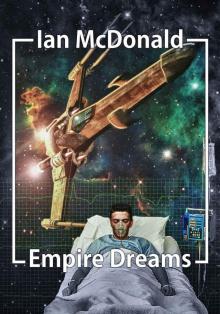 Empire Dreams
Empire Dreams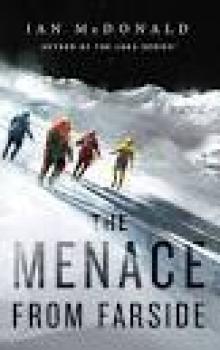 The Menace from Farside
The Menace from Farside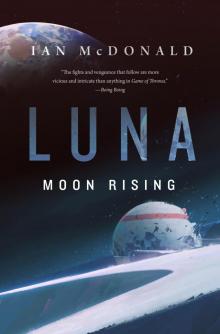 Luna: Moon Rising
Luna: Moon Rising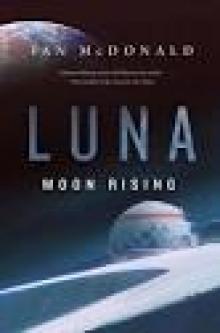 Moon Rising
Moon Rising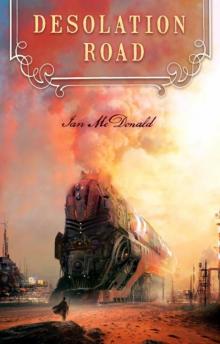 Desolation Road dru-1
Desolation Road dru-1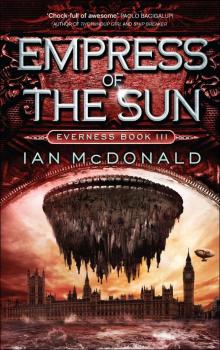 Empress of the Sun
Empress of the Sun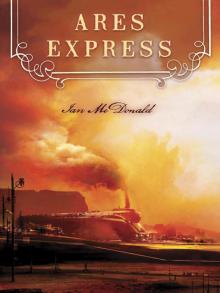 Ares Express dru-2
Ares Express dru-2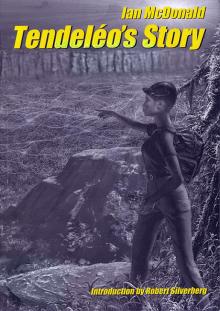 Tendeléo’s Story
Tendeléo’s Story River Of Gods
River Of Gods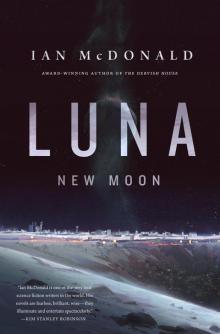 Luna
Luna![Cyberabad Days - [River of Gods 02] Read online](http://i1.bookreadfree.com/i1/03/29/cyberabad_days_-_river_of_gods_02_preview.jpg) Cyberabad Days - [River of Gods 02]
Cyberabad Days - [River of Gods 02]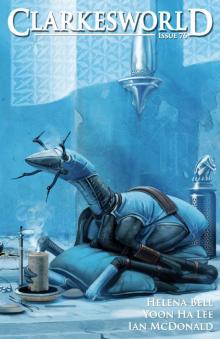 Clarkesworld Magazine Issue 76
Clarkesworld Magazine Issue 76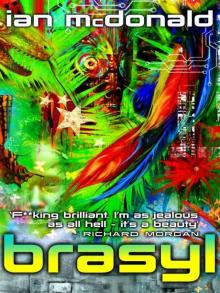 Brasyl (GollanczF.)
Brasyl (GollanczF.)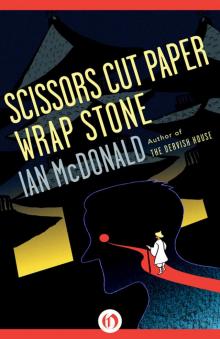 Scissors Cut Paper Wrap Stone
Scissors Cut Paper Wrap Stone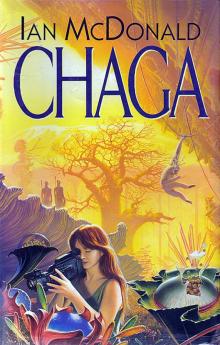 Chaga
Chaga Time Was
Time Was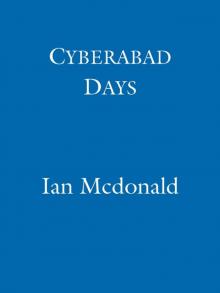 Cyberabad Days
Cyberabad Days Be My Enemy
Be My Enemy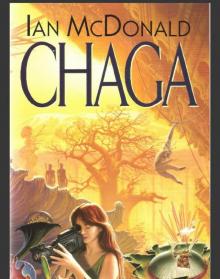 Changa
Changa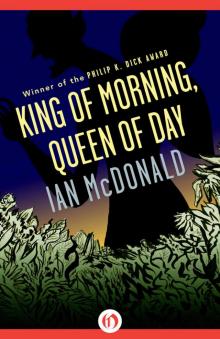 King of Morning, Queen of Day
King of Morning, Queen of Day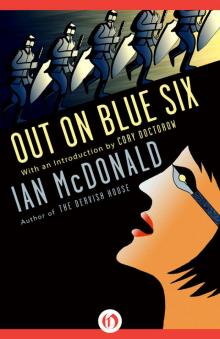 Out on Blue Six
Out on Blue Six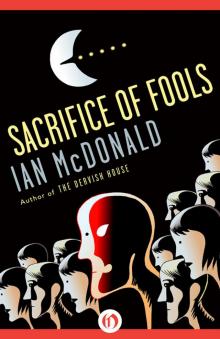 Sacrifice of Fools
Sacrifice of Fools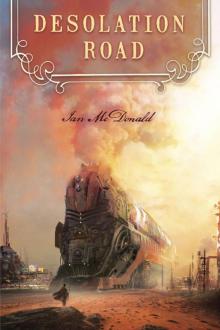 Desolation Road
Desolation Road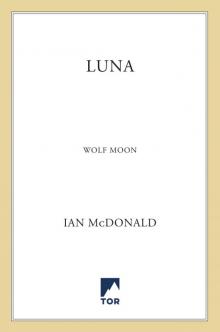 Luna--Wolf Moon--A Novel
Luna--Wolf Moon--A Novel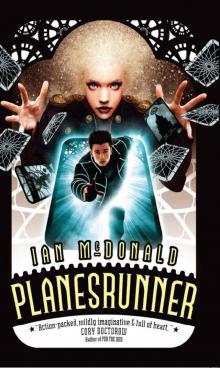 Planesrunner (Everness Book One)
Planesrunner (Everness Book One)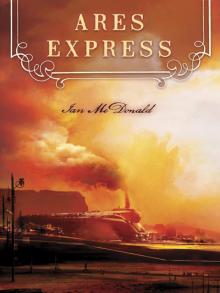 Ares Express
Ares Express